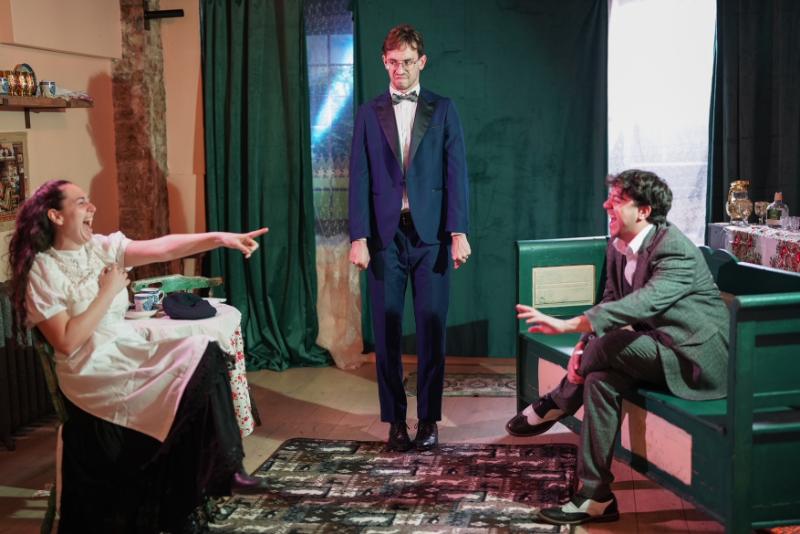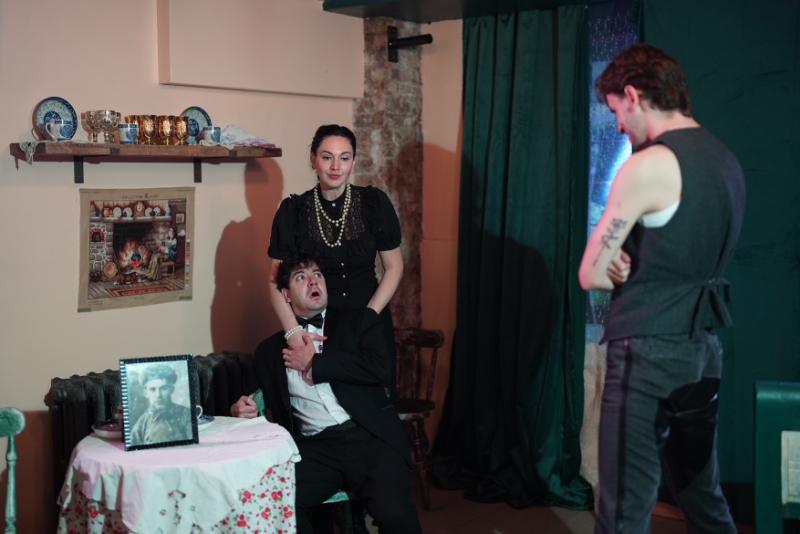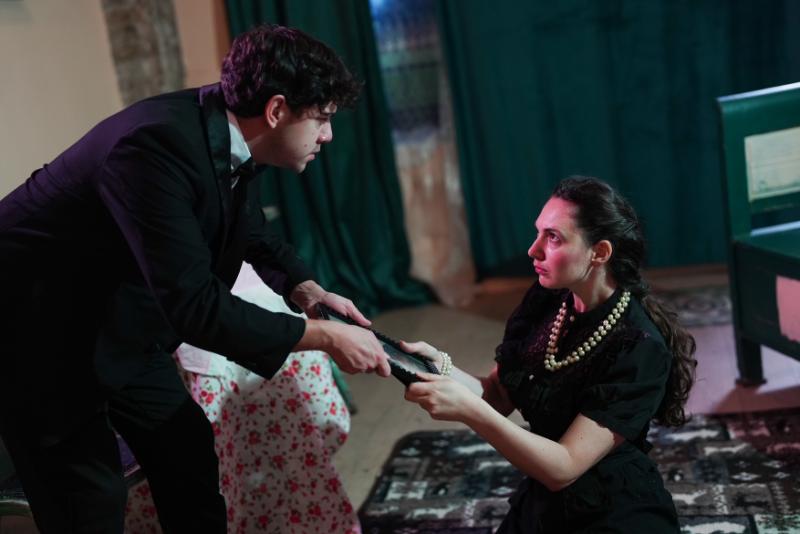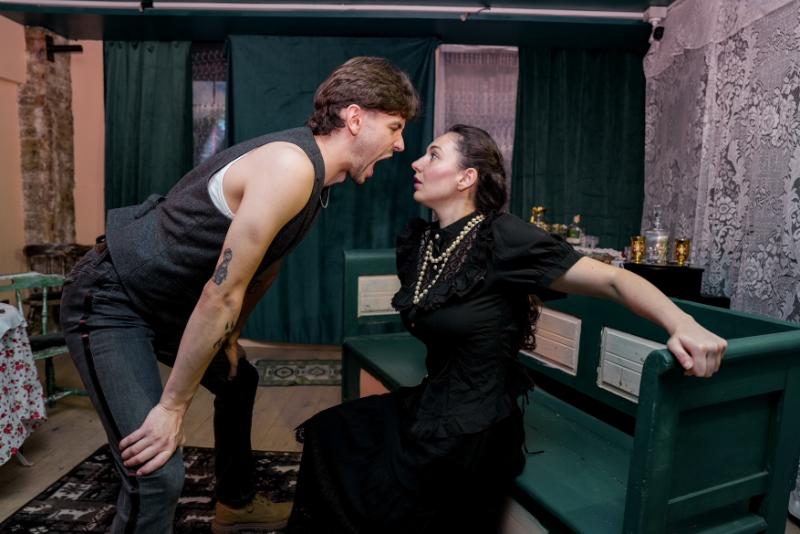Review: The Bear Proposal – an Anton Chekhov Adaptation

There’s no surer way to feel better about your circumstances than getting a little perspective. And if life can’t offer that perspective, then you can certainly find it at the theatre. Tucked away in the basement of a charming Camden cafe is the Narnia-gate to the world of 19th century Russian dysfunction. Russian literature is the gift that keeps on giving, as far as perspective is concerned, but when the bleak is coupled with outrageous hilarity as in The Bear Proposal, the resulting madness makes for the perfect anaesthetic to reality – while being a profoundly accurate depiction of it.
Few of Russia’s greats are as venerated as Chekhov. Renowned for his plays and short stories, Anton Chekhov was a pioneer of modernism in theatre, capturing raw human nature through the use of simplistic, yet powerfully astute observations and writing techniques. Among his most famous plays are The Seagull and The Cherry Orchard, both revitalised on stage again and again for painting both a dark and humorous picture of conflict, desires and morality, with complex relationships between flawed characters that are as absurd as they are vulnerable.

Photography courtesy of Crispian Blaize Photography
The Bear and The Proposal were originally two short plays, typically accompanied by a third called Drama. The Libra Theatre Cafe’s latest Chekhov iteration is an amalgamation of the first two. One play in two parts, starting with The Proposal and carrying those same characters over into The Bear.
If you’re wondering what a “theatre cafe” is, the Libra answers that question in a way only Camden could. You walk into a cosy, yet vibrant bar/cafe hybrid, where having some tea and cake is just as welcome as enjoying a cocktail – or to be in keeping with the theme of the play – a shot of vodka.
Descending the stairs, you won’t find a stage with tiered seats, but you literally walk into a quintessential Russian babushka’s living room. Family portraits strewn about side by side with icons, an assortment of floral scarves hanging as decoration or hiding equally gaudy peeling wallpaper. Once ornate, now dilapidated, mismatched furniture salvaged to form a dining suite, which features little to no food – but plenty of drink. The authenticity of this set is truly extraordinary. There are even plates of gherkins for the audience to snack on during the performance. You’re not in a theatre – you’ve been transported to old-world Russia.

Left to right: Simina Ellis, Sonny Simonelli and Curtis Burrows
Act I introduces us to Chubukhov, a well meaning but very “over it all” man, who gets through his weary life on a steady diet of liquor and light-hearted acceptance. His constant companion is his fiery sister, interminably bitter as any labour hardened spinster is expected to be. Their monotonous coexistence is shattered when a dithering suitor with a weak constitution comes to ask for Natalya’s hand. Seemingly delighted at the chance of being someone’s – anyone’s – wife, what should have been a mutually beneficial, if not romantic, proposal turns into a rage-fuelled calamity as the couple instead winds up in a heated debate over who owns whose land.
Act II (spoiler alert) starts after the poor nervous wreck of a husband dies shortly after the nuptials, leaving the former spinster a grieving widow. Though it seems as though much of her grief is a self-pitying performance, which she turns to overdrive when a hot-tempered visitor shows up at her door, demanding payment of an outstanding debt left by the deceased. Natalya and the Bear prove equally matched in fury and confusion over their feelings. Needless to say, drama ensues.
Throughout both acts, the petty squabbles that balloon into life or death feuds makes you feel like you’re watching an exaggerated telenovela – except for the fact that this is a true to life snapshot of Russian family dynamics. And realising this makes all the lunacy that unfolds in front of you that much more amusing.
Simina Ellis, who helms the Libra with her best friend and fellow actor Jessica Cole, delivers a wonderfully energetic performance, conveying all the character traits of an angry, overworked, lonely but indefatigable Russian woman. Ellis translates Natalya’s self-assured need for vindication into a wonderfully explosive heroine, which has to be seen to be believed. She is as cheeky as she is obstinate and sets the pace of the story throughout both halves.

Sonny Simonelli has the arduous task of playing both the bumbling suitor and the passion-driven Bear, both as desirous of Natalya as they are desperate for their own validation. In both parts, he fantastically antagonises Ellis, creating an unhinged and riotous back and forth that keeps the audience at the edge of their seat. Simonelli’s turn as these “night and day” characters perfectly demonstrates both sides of Russian male neuroticism, equal parts anger and insecurity, expressed in endlessly fun to watch physicality.
Curtis Burrows was a particular highlight. While having the least lines of the three, Chubukov is essentially the host to the lovers’ hostilities and acts not only as an attempted mediator in the fights, but the audience’s life-line to some semblance of sanity. Chubukov is comparatively the most tempered of the trio and Burrows gives a fantastically nuanced performance, with comedic timing and body language reminiscent of Nathan Lane at his very best. Russian humour can be tricky to translate to a Western audience, as it can be both subtly complex and flamboyant. Whereas our lovers lean into the latter, Burrows brilliantly delivers on the former.
All the actors are to be praised for bringing to life three characters that are so driven by their convictions, that they are utterly lacking in self-awareness – which could almost make them pitiable, if it just wasn’t so damn funny! While you could easily picture this production being scaled up in a large theatre, the truly immersive nature of the Libra setup really makes you feel caught up in the middle of this family’s melodrama. When the actors’ soliloquies effectively break the fourth wall, it’s easy to forget that you’re an audience member and more a nosy neighbour!

Chekhov’s message with these short plays was to use farce to show that declarations of love and marriage are not always some lyrical, romanticised affair. Using irony and silly arguments, he lights the match to showcase the messier side of courtship, from superficial motives, to the absurdity of societal expectations. These ridiculous interpersonal dynamics ultimately leading to attachments being formed, even if out of mutually assured conflict and baser need for companionship.
This production is a bona fide adaptation of the source material and the cast give a brazenly delightful demonstration that there really is a hilariously fine line between love and hysteria.





